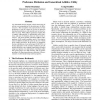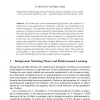123 search results - page 5 / 25 » Intelligence Analysis Using Quantitative Preferences |
132
click to vote
ECAL
1999
Springer
15 years 6 months ago
1999
Springer
We use a new general-purpose model of neutral evolution of genotypes to make quantitative comparisons of diversity and adaptive evolutionary activity as a function of mutation rate...
112
click to vote
CJ
2010
14 years 11 months ago
2010
This paper studies semantic efficiency measures for ambient intelligence. We follow an agent-based approach and investigate how large quantities of information can be efficiently ...
121
click to vote
AAAI
2006
15 years 3 months ago
2006
Any automated decision support software must tailor its actions or recommendations to the preferences of different users. Thus it requires some representation of user preferences ...
116
Voted
ECAL
2005
Springer
15 years 7 months ago
2005
Springer
An evolutionary reinforcement-learning algorithm, the operation of which was not associated with an optimality condition, was instantiated in an artificial organism. The algorithm ...
135
click to vote
ECIS
2000
15 years 3 months ago
2000
This paper presents a concept for the integration of quantitative and qualitative information sources with their accompanying management support functionalities from navigation and...


